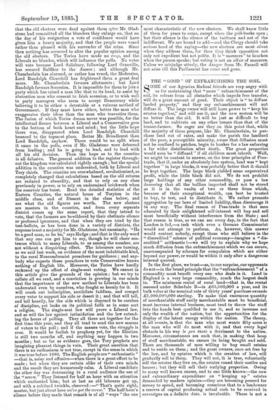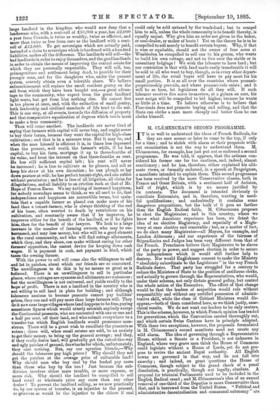THE "GOOD ' OF ENFRANCHISING THE SOIL.
SOME of our Agrarian Radical friends are very angry with us for maintaining that " mere " enfranchisement of the soil, its release from all obstacles which impede free transfer, will do a great amount of good. Their object is "to diffuse landed property," and they say enfranchisement will not diffuse it. The large owner will still have power to "keep his estates together," and will use it, and the new system will be no better than the old. It will be just as difficult to buy land, and to cultivate on any other tenure than that of the tenant-farmer. So eager are they on this point that, while the majority of them propose, like Mr. Chamberlain, to pur- chase land out of rates, and make the parish the landlord of the poor, a perceptible minority, aware that diffusion must not be confined to patches, begin to hanker for a law enforcing a far wider distribution after death. The great properties would soon be " diffused " if all children must inherit. Well, we might be content to answer, on the true principles of Free- trade, that if, under an absolutely free system, land was " kept together" in large blocks, it was probably better that it should be kept together. The large block yielded some unperceived profit, while the little block did not. We do not prohibit large holdings of any other commodity, or pass a law decreeing that all the bullion imported shall not be stored as it is in the vaults of two or three firms which, because of their exceptional wealth, can best be trusted to buy, to test, and to distribute it. We rather promote aggregation by our laws of limited liability, than discourage it in any way. The final reason of Free-trade is that men educated by their enlightened self-interest will buy and sell most beneficially without interference from the State ; and that reason is true, as we can see every day, in the fact that London is fed,—a task which even a German Commissariat would not attempt to perform. As, however, this answer would content nobody, except those who still believe in the " discredited " science of political economy—imagine a " dis- credited " arithmetic I—we will try to explain why we hope much diffusion from the enfranchisement which we can secure, unaccompanied by schemes for compulsion which are either beyond our power, or would be within it only after a dangerous internal quarrel.
In the first place, we trust—as, to our surprise, our opponents do not—in the broad principle that the "enfranchisement" of a commodity must benefit every one who deals in it. Land in England is a very large commodity, much the largest dealt in. The minimum rental of rural land—that is, the rental assessed under Schedule B—is £65,500,000 a year, and its bulk value at the nominal rate of thirty years' purchase exceeds £1,900,000,000 sterling. To make that enormous quantity of merchantable stuff easily merchantable must be beneficial, must increase internal business, must tend to throw the stuff into the hands best qualified to use it, and so increase not only the wealth of the nation, but the opportunities for the display of the latent energy within the nation. The theory, at all events, is that the man who most wants fifty acres is
the man who will do most with it, and that every legal obstacle in his way is pro tanto a detriment to the nation.
Moreover, circumstances are such that, in making that heap of stuff merchantable, we ensure its being bought and sold. There are thousands of men willing to buy small estates and to reside on them ; and the great owners, once set free by the law, and by opinion which is the creation of law, will gradually sell to them. They will not, it is true, voluntarily sell the estates they live on, the estates round their castles and houses ; but they will sell their outlying properties. Owing to many well known causes, and to one little known—the new and extraordinary expenditure on "keeping up" estates demanded by modern opinion—they are becoming pressed for money to spend, and becoming conscious that to a landowner a reserve of capital producing actual cash to be received in sovereigns on a definite date, is invaluable. There is not a large landlord in the kingdom who would now deny that a landowner who, with a rent-roll of £10,000 a year, has £2,000 a year from Consols, is twice as wealthy, twice as efficient, and more than twice as free from care as the landlord with a rent- roll of £12.000. To get sovereigns which are actually paid, instead of a claim to sovereigns which is burdened with a hundred liabilities, makes all the difference. The landlords will sell—the bad landlords in order to enjoy themselves, and the good landlords in order to obtain the means of improving the central estate for which they are personally responsible. They will sell, too, primogeniture and settlement being dead, to provide for their younger sons, and for the daughters who, under the present system, scarcely obtain even a tolerable share. We believe enfranchisement will replace the small resident gentry on the soil from which they have been bought out,—a great advan- tage to the community, who expect from the great landlord light rents, but get from him nothing else. He cannot live in ten places at once, and, with the extinction of small gentry, both leadership and civilised standards of life tend to die out. This is one step, at all events, towards the diffusion of property and that comparative equalisation of degrees which tends most to make a true community.
Then will come another. The landlords are never tired of saying that farmers with capital will never buy, and ought never to buy their farms, because they want the capital for high-class cultivation ; and that is in a measure true. But it may be, and when the man himself is efficient it is, in times less depressed than the present, well worth the farmer's while, if he has capital, to buy his farm, mortgage it up to three-fourths of its value, and treat the interest on that three-fourths as rent. He has still sufficient capital left ; his rent will never be increased ; he is free to cultivate as he pleases, and sell or keep his straw at his own discretion ; he can plough or lay down pasture at will ; he has perfect tenant-right, and can sublet without permission ; and he is free of all litigation, all claim for dilapidations, and all liability to an eviction such as that of Mr. Rope of Fenton Barns. We say nothing of increased happiness, for nobody nowadays seems to think, as we all used to do, that independence and happiness are convertible terms, but main- tain that a capable farmer so placed can make more of his land than a tenant-farmer, who is always thinking of the end of his lease, often worried to death by restrictions on his cultivation, and constantly aware that if he improves, he improves either for the benefit of the landlord, or if he fights him, then for the benefit of the lawyers. We look to a large increase in the number of farming owners, who may be em- barrassed, and may lose money, but who will be a good element in the rural community, and who will find cottage allotments, which they, and they alone, can make without caring for other farmers' opposition, the easiest device for keeping down cash wages. It is payment in cash, not payment in kind, which taxes the owning farmer.
With the power to sell will come also the willingness to sell and let in patches, about which our friends are so concerned. The unwillingness to do this is by no means so great as is believed. There is an unwillingness to sell in particular places, where cottages are eyesores and allotments are nuisances ; but the unwillingness is not universal, and yields readily to the hope of profit. There is not a landlord in the country who is not willing to sell land in plots for building ; and although labourers anxious to become peasants cannot pay builders' prices, they can and will pay more than large farmers will. They do it now near large villages where land happens to be free, paying sometimes figures which would utterly astonish anybody except the Continental peasants, who are contented with one or one and a half per cent. off their land, and who submit everywhere to a transfer-tax which English landlords would pronounce mon- strous. There will be a great wish to conciliate the peasants as voters ; there will, when small estates are sold, be an anxiety to get their money. to bring up the general average ; and they, if they really desire land, will gradually get the out-of-the-way and ugly patches of ground, drawbacks for which, unfortunately, they care nothing. Bat, say our agrarian friends,—Why should the labourers pay high prices ? Why should they not get the patches at the average price of culturable land ? Why should men who buy coal by the bushel pay more than those who buy by the ton ? Just because the sub- division involves either more trouble, or more expense, or more risk. Why should the landlord be compelled to sell land retail at wholesale price any more than any other dealer? To prevent the landlord selling, as we now practically do, by our system of transfer, is an injustice to the peasant, as grievous as would be the injustice to the citizen if coal could only be sold untaxed by the truck-load ; but to compel him to sell, unless the whole community is to benefit thereby, is equally unjust. Why give him an order not given to the baker, or coal-dealer, or maker of boots ? Yet on the theory he is to be compelled to sell merely to benefit certain buyers. Why, if that is wise or equitable, should not the owner of four acres at Wimbledon be compelled to sell one to his groom, who wants to build his own cottage, and not to live over the stable or in unsanitary lodgings ? We wish the labourer to have land ; but our contention is that with land made easily transferable it will be sold to all who want to buy, though, as in every other depart- ment of life, the retail buyer will have to pay most for his small portion. It is so all over the countries where peasant- proprietorship prevails, and where peasant-rule exists ; and it will be so here, let legislators do all they will. If each labourer receives five acres to-morrow, at a guinea an acre, his next assign will be compelled to bid higher, because he wants BO little at a time. To believe otherwise is to believe that Free-trade does not promote buying and selling, and that the State can clothe a man more cheaply and better than he can clothe himself.



































 Previous page
Previous page